安徽省2021年中考英语语法专题突破一-----名词(共49张PPT)
文档属性
| 名称 | 安徽省2021年中考英语语法专题突破一-----名词(共49张PPT) |  | |
| 格式 | zip | ||
| 文件大小 | 871.0KB | ||
| 资源类型 | 教案 | ||
| 版本资源 | 通用版 | ||
| 科目 | 英语 | ||
| 更新时间 | 2020-12-22 16:09:55 | ||
图片预览

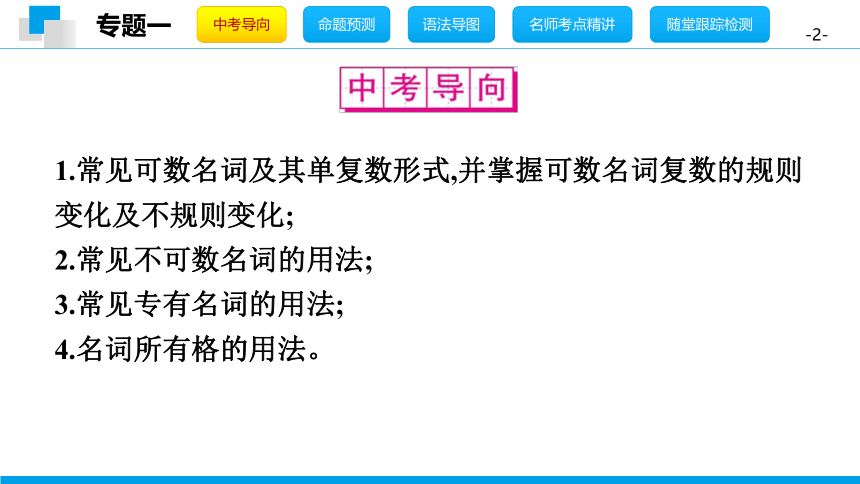
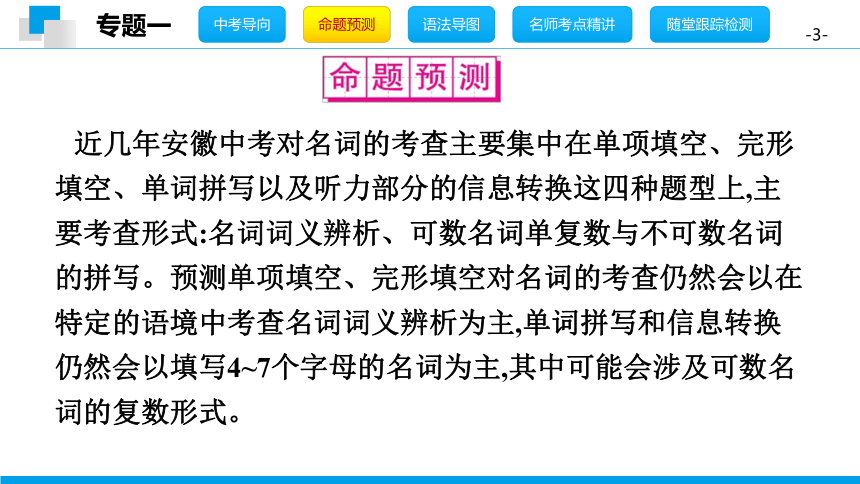
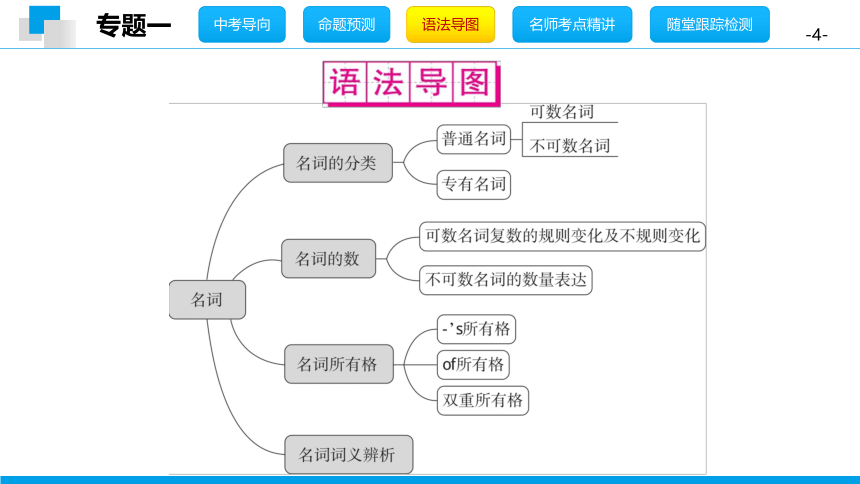
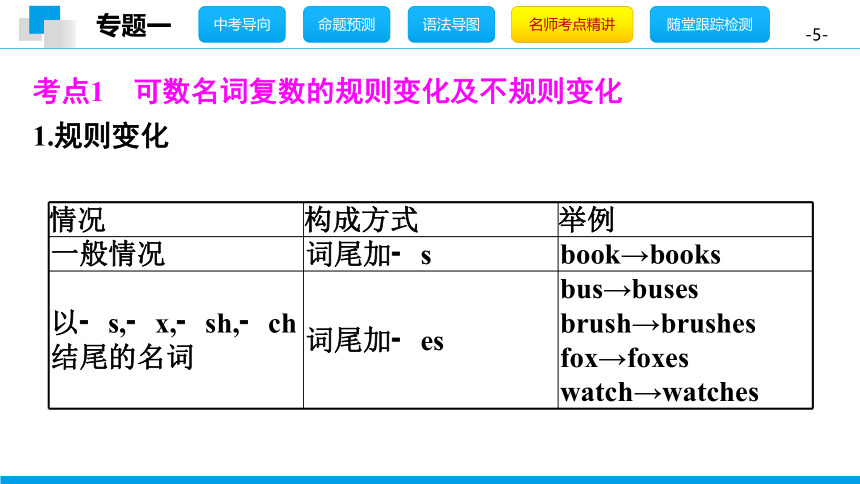
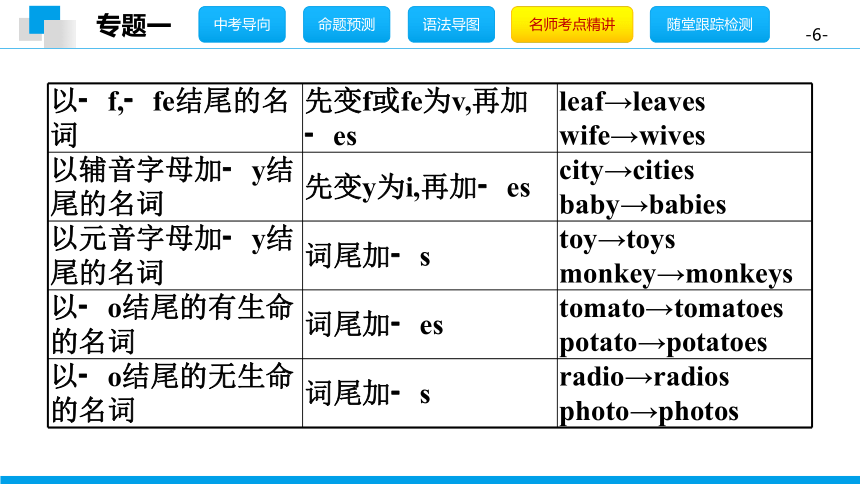
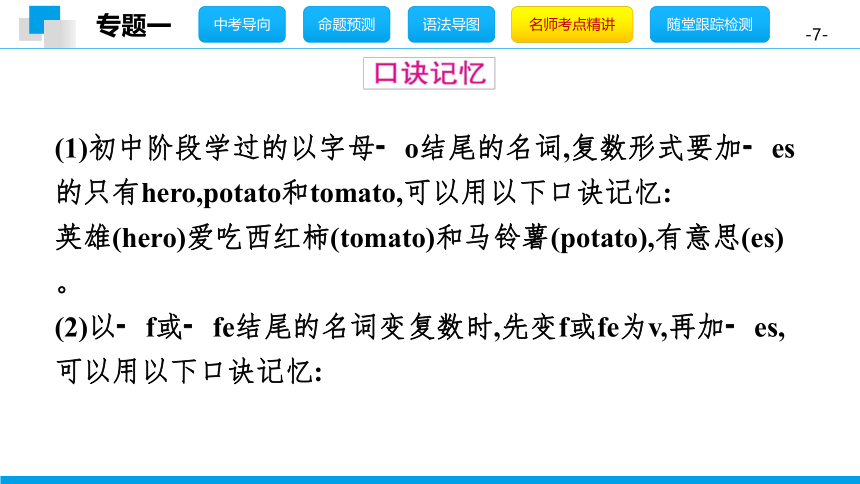
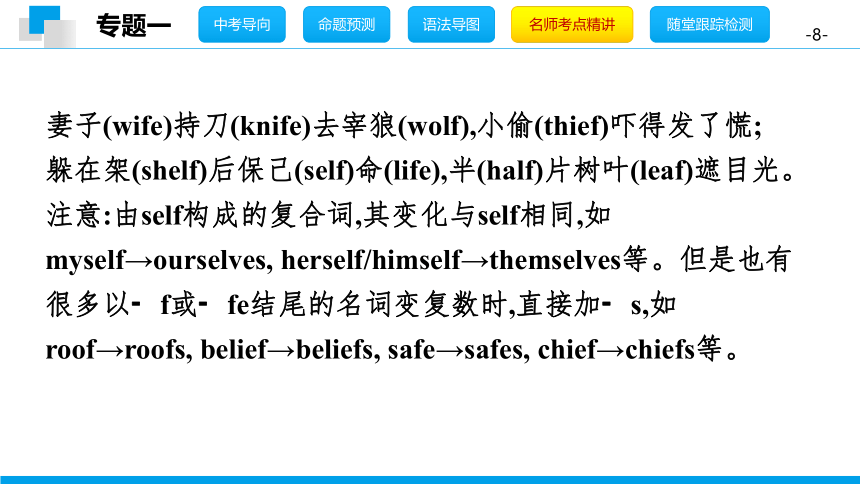
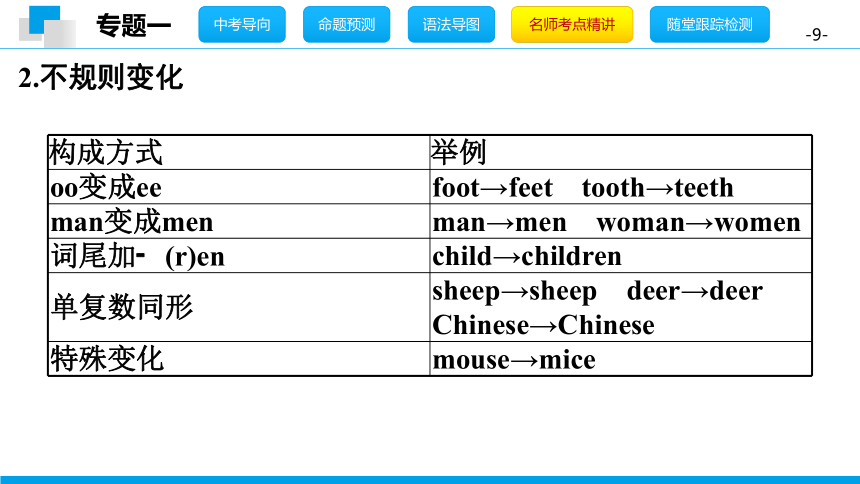
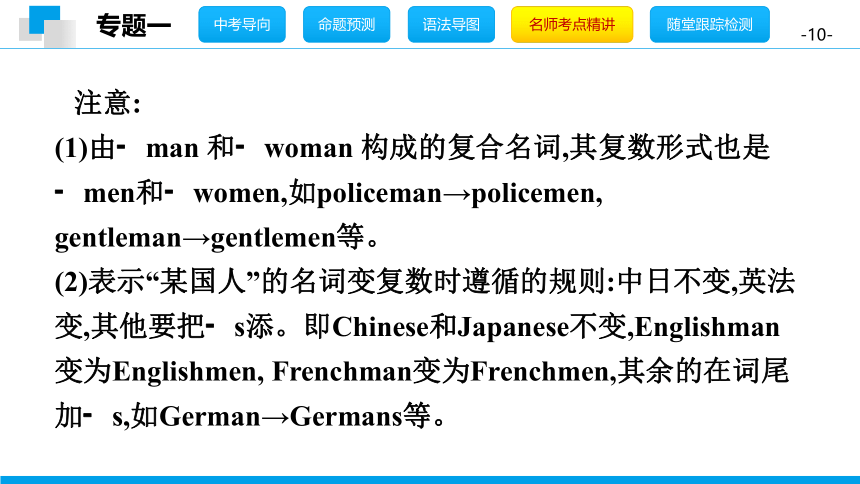
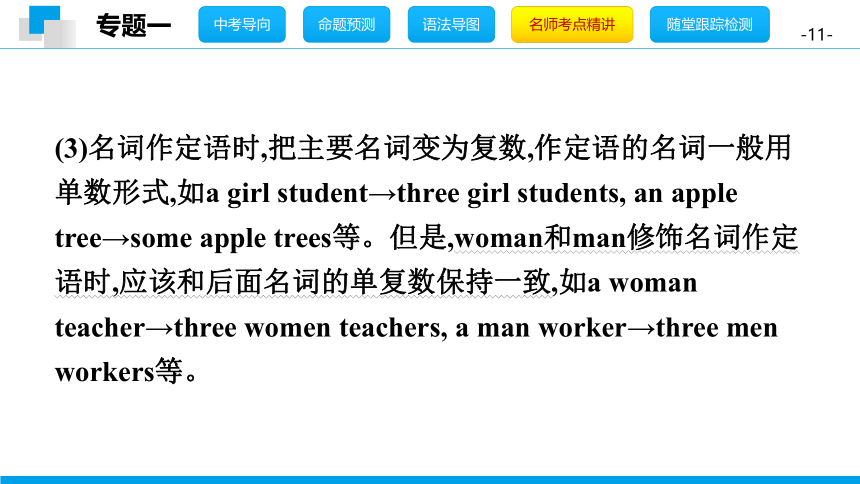
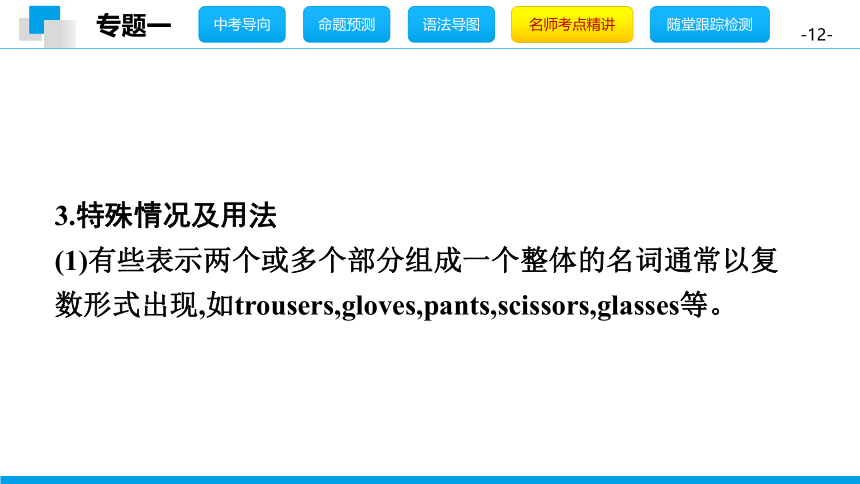
文档简介
(共49张PPT)
专题一 名 词
1.常见可数名词及其单复数形式,并掌握可数名词复数的规则变化及不规则变化;
2.常见不可数名词的用法;
3.常见专有名词的用法;
4.名词所有格的用法。
近几年安徽中考对名词的考查主要集中在单项填空、完形填空、单词拼写以及听力部分的信息转换这四种题型上,主要考查形式:名词词义辨析、可数名词单复数与不可数名词的拼写。预测单项填空、完形填空对名词的考查仍然会以在特定的语境中考查名词词义辨析为主,单词拼写和信息转换仍然会以填写4~7个字母的名词为主,其中可能会涉及可数名词的复数形式。
考点1 可数名词复数的规则变化及不规则变化
1.规则变化
情况
构成方式
举例
一般情况
词尾加?s
book→books
以?s,?x,?sh,?ch结尾的名词
词尾加?es
bus→buses
brush→brushes
fox→foxes
watch→watches
以?f,?fe结尾的名词
先变f或fe为v,再加?es
leaf→leaves
wife→wives
以辅音字母加?y结尾的名词
先变y为i,再加?es
city→cities
baby→babies
以元音字母加?y结尾的名词
词尾加?s
toy→toys
monkey→monkeys
以?o结尾的有生命的名词
词尾加?es
tomato→tomatoes
potato→potatoes
以?o结尾的无生命的名词
词尾加?s
radio→radios
photo→photos
(1)初中阶段学过的以字母?o结尾的名词,复数形式要加?es的只有hero,potato和tomato,可以用以下口诀记忆:
英雄(hero)爱吃西红柿(tomato)和马铃薯(potato),有意思(es)。
(2)以?f或?fe结尾的名词变复数时,先变f或fe为v,再加?es,可以用以下口诀记忆:
妻子(wife)持刀(knife)去宰狼(wolf),小偷(thief)吓得发了慌;
躲在架(shelf)后保己(self)命(life),半(half)片树叶(leaf)遮目光。
注意:由self构成的复合词,其变化与self相同,如myself→ourselves,
herself/himself→themselves等。但是也有很多以?f或?fe结尾的名词变复数时,直接加?s,如roof→roofs,
belief→beliefs,
safe→safes,
chief→chiefs等。
2.不规则变化
构成方式
举例
oo变成ee
foot→feet tooth→teeth
man变成men
man→men woman→women
词尾加?(r)en
child→children
单复数同形
sheep→sheep deer→deer
Chinese→Chinese
特殊变化
mouse→mice
注意:
(1)由?man
和?woman
构成的复合名词,其复数形式也是?men和?women,如policeman→policemen,
gentleman→gentlemen等。
(2)表示“某国人”的名词变复数时遵循的规则:中日不变,英法变,其他要把?s添。即Chinese和Japanese不变,Englishman变为Englishmen,
Frenchman变为Frenchmen,其余的在词尾加?s,如German→Germans等。
(3)名词作定语时,把主要名词变为复数,作定语的名词一般用单数形式,如a
girl
student→three
girl
students,
an
apple
tree→some
apple
trees等。但是,woman和man修饰名词作定语时,应该和后面名词的单复数保持一致,如a
woman
teacher→three
women
teachers,
a
man
worker→three
men
workers等。
3.特殊情况及用法
(1)有些表示两个或多个部分组成一个整体的名词通常以复数形式出现,如trousers,gloves,pants,scissors,glasses等。
(2)有些集体名词以单数形式出现,但表示复数意义,作主语时,谓语动词用复数形式,如people,
police等。有些集体名词通常只用作单数,相当于不可数名词,如clothing等。有些集体名词既可以表示单数意义,又可以表示复数意义。当它们作主语时,如果表示一个整体,谓语动词用单数形式;如果表示集体中的成员,谓语动词用复数形式,如public,
family,
team,
group,
class,
crowd等。
(3)有些名词表示意义不同时,复数形式不同。例如,fish表示“鱼”的条数时,单复数同形;表示“鱼”的种类时,复数形式为fishes;表示“鱼肉”时为不可数名词。
(4)某些名词虽以?s结尾,但是实际上是不可数名词,表示单数意义,如news,
physics等。
(5)由“基数词+名词+形容词”构成的复合形容词中的名词要用单数形式。例如:
He
is
an
11?year?old
boy.他是一个11岁的男孩。
考点2 不可数名词
1.可数名词和不可数名词的区别:
(1)形式不同
可数名词是可以用来计数的名词,有单数和复数形式,如duck→ducks,
tree→trees等。不可数名词是不可以用来直接计数的名词,一般没有复数形式,作主语时,谓语动词用单数形式。
(2)冠词不同
单数可数名词表示泛指时,前面要用不定冠词a/an,表示特指时,前面要用定冠词the;而不可数名词前不能用a/an修饰,表示特指时,前面要用定冠词the。
(3)数量表示方法不同
可数名词前可用具体的数词来表示具体的数量,如two
girls,
four
books等。不可数名词前不可以直接用one,
two等词修饰限定,一般用以下方式表达数量:
情况
构成方式
举例
具体
的量
不定冠词/基数词+表数量单位的名词+of+不可数名词
a
piece
of
paper一张纸
three
kilos
of
rice
3千克大米
大概
的量
表示量的限定词(some,much,little,a
little,a
lot
of等)+不可数名词
some
water一些水
a
lot
of
money许多钱
2.不可数名词的分类:
类别
举例
抽象
advice,time,knowledge,help,fun,trouble...
材料
paper,plastic,silk,gold,cotton...
饮食
food,water,coffee,wine,meat,bread,salt,rice...
自然
light,fire,rain,wind,snow,ice,weather...
3.有些名词既可作可数名词,也可作不可数名词,但词义有所不同。例如:
不可数名词
可数名词
chicken鸡肉
chickens小鸡
paper纸张
papers
试卷
experience经验
experiences经历
room空间
rooms房间
glass玻璃
glasses眼镜
orange橘汁
oranges橘子
wood木头
woods
树林
exercise锻炼
exercises练习
work工作
works作品
考点3 专有名词
专有名词是表示个人、国家、地方、机构、组织等的专有名称,如Anderson,
China,
San
Francisco,
British
Airways,
the
People’s
Congress,
the
Democratic
Party,
The
New
York
Times等,其特点是每个单词的第一个字母通常要大写。
1.人名
(1)姓名前通常不用冠词,如Mary
Smith,
George
Washington等。
(2)姓氏复数前加定冠词the可表示全家人。例如:
The
Greens
have
gone
to
America.格林一家去了美国。
2.地名
(1)大部分地名前不用定冠词,如Asia,
London,
Shanghai等。
(2)山脉、群岛、海洋、河流、运河、海湾、海峡、半岛、沙漠等名称前一般加定冠词,如the
Pacific,
the
English
Channel,
the
Sahara等。
3.日期
(1)节日前通常不用冠词,如Christmas,
National
Day等。
(2)星期前通常不用冠词,如Sunday,
Tuesday等。
(3)月份前通常不用冠词,如April,
December等。
考点4 名词所有格
名词所有格分三种:一种是由“?’s”或“?’”构成的所有格;一种是由of构成的所有格;另一种是双重所有格。
1.?’s所有格
情况
构成方式
举例
一般情况
词尾加?’s
Lucy’s
bag
children’s
readings
以?s或?es结尾的复数名词
词尾加?’
the
workers’
club
Teachers’
Day
以?s结尾的人名
词尾加?’s或?’
Engels’s
works=Engels’
works
Charles’s
address=Charles’
address
复合名词
在最后一个词的词尾加?’s或?’
the
man
worker’s
daughter
the
women
teachers’
books
表示词组内几个并列名词各自的所有关系时
分别在各个名词词尾加?’s
Tom’s,
Mike’s
and
Lucy’s
books(三人各自的书)
表示词组内几个并列名词共同的所有关系时
在最后一个名词词尾加?’s
Tom,
Mike
and
Lucy’s
books(三人共有的书)
表示某人家、店铺等时
词尾加?’s,一般省略它所修饰的名词
at
Mr.
Green’s
at
the
doctor’s
?’s所有格通常情况下表示有生命的名词的所有关系,但有些表示时间、距离、国家、度量衡、价值、自然现象等无生命事物的名词,也可以用?’s所有格,如China’s
industry,
today’s
newspaper,
a
ton’s
weight等。
2.
of所有格
一般情况下,表示无生命事物的名词的所有关系,通常采用“of+名词”的结构,如the
gate
of
the
school,
the
window
of
the
room等。但是,当名词较长或名词的定语较长时,也可以用of所有格表示有生命的事物的所有关系,如the
classrooms
of
the
second?year
students等。
3.
双重所有格
双重所有格由“of+名词?’s”或“of+名词性物主代词”构成,如a
good
friend
of
my
brother’s,
a
bag
of
hers等。
当中心词为picture,
painting,
photo等名词时,用双重所有格来表示某人拥有的肖像、照片等,而用of所有格来表示某人自己的肖像、照片等。例如:
a
photo
of
Mary’s(玛丽拥有的照片中的一张,不一定是她本人的照片)
a
photo
of
Mary(玛丽本人的照片)
考点5 名词词义辨析
名词词义辨析是近五年安徽中考的必考点,主要在单项填空和完形填空中考查。单项填空每年1题,完形填空每年5至7题。解答此类题时,首先要确定所给名词的含义,然后分析语境和逻辑关系,确定正确答案。一些逻辑性的关联词可以帮助我们迅速确定答案,如借书(book)要去图书馆(library),渴了(thirsty)需要喝水(water)或饮料(tea,
coffee,
juice)等。另外,考生也可以采用代入法,直接将四个选项代入空格处,看哪个选项最符合语境和逻辑。
在中考试题中,名词可谓无处不在,但重点分布在听力、单项填空、完形填空及单词拼写几个题型中,并且有词形(单复数)的变化。现将易混淆的名词进行辨析,具体如下:
1.problem,question,trouble和matter
名词
用法
例句
problem
指客观存在的疑难问题,有时指较严重的、急需解决(solve,work
out)的问题。
It’s
difficult
to
solve
the
traffic
problem.解决交通问题是困难的。
question
指需要说话者寻找答案的问题,常与动词ask或answer连用。
Answer
my
question,“How
old
are
you?”
回答我的问题:“你多大了?”
trouble
指遇到的麻烦、问题,尤指棘手的问题。
What’s
your
trouble,young
man?年轻人,你怎么了?
matter
意为“事情;麻烦”,指具有某种特征的事例。
What’s
the
matter
with
your
computer?你的电脑出了什么问题?
2.sound,noise和voice
名词
用法
例句
sound
泛指各种声音,不论其高低、是否悦耳等。
Light
travels
faster
than
sound.光的传播速度比声音的传播速度快。
noise
意为“噪音”,指人们不愿听到的声音或嘈杂声,既可以作可数名词,也可以作不可数名词。
I
heard
a
loud
noise
outside.我听到外面有很大的响声。
No
one
likes
the
noise
in
the
street.没有人喜欢街上的噪声。
voice
可以指人说话、唱歌或发笑的声音以及鸟鸣声、乐器声等悦耳之声,也可指发言权。
He
has
a
beautiful
voice.他有一副优美的嗓音。
3.work和job
名词
用法
举例
work
多指生产或完成某物所需的体力或脑力活动,为不可数名词。
at
work在工作
out
of
work失业
job
多指为换取报酬而进行的活动,尤指某人的手艺、行业或职业工作,为可数名词。
lose
one’s
job=be
out
of
a
job失业
do
a
good
job干得不错
4.message,news和information
名词
用法
举例
message
指信息、留言,为可数名词,常指书面或口头消息。
leave/take
a
message留/捎口信
news
指消息、新闻,为不可数名词。
bad
news坏消息
information
指情报、信息、资讯,为不可数名词。
personal
information个人信息
5.suggestion和advice
名词
用法
举例
suggestion
指建议、意见,为可数名词。
a
few
suggestions一些建议
advice
指建议、意见,为不可数名词。
a
piece
of
advice一条建议
some
advice一些建议
Ⅰ.单项填空
1.—We
practiced
every
afternoon
and
we
won
the
football
game
in
the
end.
—Great!
So
success
requires
time
and .(
B
)?
A.task
B.effort
C.wealth
D.pride
2.—Do
you
like
history?
—No,
I
don’t.
Every
history
class
gives
me
a .
(
B
)?
A.surprise
B.headache
C.hand
D.present
3.—More
and
more
foreigners
are
becoming
interested
in
Beijing
Opera.
—That’s
true.
It’s
an
important
part
of
Chinese
.
(
A
)?
A.culture
B.invention
C.custom
D.influence
4.If
by
any
chance
someone
comes
to
see
me,
ask
them
to
leave
a .(
C
)?
A.notice
B.letter
C.message
D.sentence
5.—It’s
useful
for
the
deaf
people
to
learn
sign
language.
—Yes,
it’s
a
major
way
of for
them.(
D
)?
A.suggestion
B.vacation
C.production
D.communication
6.I
think
we
will
achieve
our
dreams,
as
long
as
we
have
the to
fight
for
them.(
D
)?
A.interest
B.opinion
C.praise
D.courage
7.—Mr.
Smith,
I’m
sorry
I
cheated
in
the
math
test.
—Keep
it
as
a
between
us,
but
promise
me
you
won’t
do
it
again.(
C
)?
A.decision
B.result
C.secret
D.service
8.Tom
was
badly
hurt
in
the
match.
They
carried
him
to
the
as
quickly
as
possible.(
D
)?
A.bank
B.office
C.shop
D.hospital
9.He
has
much as
an
engineer.
So
he
can
build
the
bridge
successfully.(
B
)?
A.regret
B.experience
C.surface
D.service
10.—How
did
you
put
together
the
model
plane
so
perfectly?
—It’s
easy.
I
just
followed
the .(
A
)?
A.instructions
B.instruments
C.interviews
D.inventions
11.—The
Chinese
scientist
Tu
Youyou
won
the
2015
Nobel
Prize.
—Her has
saved
millions
of
lives
across
the
world.
(
C
)?
A.victory
B.story
C.discovery
D.industry
12.—Look!
Here
comes
Cindy!
She
is
always
full
of .?
—So
she
is.
Because
she
takes
a
lot
of
exercise
every
day.(
D
)
A.knowledge
B.courage
C.change
D.energy
13.—Who
is
the
man
in
the
blue
car?
—He
is father.(
B
)?
A.Lily’s
and
Kate’s
B.Lily
and
Kate’s
C.Lily’s
and
Kate
D.Lily
and
Kate
14.—The
picnic
is
only
in
three
days.
Have
you
made
any
??
—Not
yet.
So
let’s
discuss
what
to
prepare.(
B
)
A.wishes
B.plans
C.mistakes
D.friends
15.—Look
at
the
clouds.
They
are
so
beautiful!
—Wow,
so
many
different ,such
as
horses,
sheep,
flowers,
etc.(
B
)?
A.sizes
B.shapes
C.colors
D.changes
Ⅱ.单词拼写
1.Do
you
have
some
methods (方法)
to
learn
English
well??
2.Mary,could
you
please
tell
me
the
truth (事实)??
3.Xiao
Liu
put
his
umbrella
in
the
corner (角落)
of
the
room.?
4.Justin
lay
back
and
enjoyed
the
peace (安宁)
of
the
summer
evening.?
5.In
the
garden,
the
leaves (树叶)
of
the
trees
have
already
fallen.?
6.China
is
a
big
and
loving
family
made
up
of
56
peoples (民族).?
7.It’s
important
to
set
your
own
goals (目标)
and
follow
them.?
8.Having
a
good
circle (圈子)
of
friends
is
helpful
to
our
study
and
life.?
9.Eating
too
much
fat (油脂)
is
bad
for
your
health.?
10.The
old
lady,
living
on
the
fifth
floor,
sometimes
dances
with
her
husband
on
the
square (广场).?
本节课后练?见强化练习册P42
专题一 名 词
1.常见可数名词及其单复数形式,并掌握可数名词复数的规则变化及不规则变化;
2.常见不可数名词的用法;
3.常见专有名词的用法;
4.名词所有格的用法。
近几年安徽中考对名词的考查主要集中在单项填空、完形填空、单词拼写以及听力部分的信息转换这四种题型上,主要考查形式:名词词义辨析、可数名词单复数与不可数名词的拼写。预测单项填空、完形填空对名词的考查仍然会以在特定的语境中考查名词词义辨析为主,单词拼写和信息转换仍然会以填写4~7个字母的名词为主,其中可能会涉及可数名词的复数形式。
考点1 可数名词复数的规则变化及不规则变化
1.规则变化
情况
构成方式
举例
一般情况
词尾加?s
book→books
以?s,?x,?sh,?ch结尾的名词
词尾加?es
bus→buses
brush→brushes
fox→foxes
watch→watches
以?f,?fe结尾的名词
先变f或fe为v,再加?es
leaf→leaves
wife→wives
以辅音字母加?y结尾的名词
先变y为i,再加?es
city→cities
baby→babies
以元音字母加?y结尾的名词
词尾加?s
toy→toys
monkey→monkeys
以?o结尾的有生命的名词
词尾加?es
tomato→tomatoes
potato→potatoes
以?o结尾的无生命的名词
词尾加?s
radio→radios
photo→photos
(1)初中阶段学过的以字母?o结尾的名词,复数形式要加?es的只有hero,potato和tomato,可以用以下口诀记忆:
英雄(hero)爱吃西红柿(tomato)和马铃薯(potato),有意思(es)。
(2)以?f或?fe结尾的名词变复数时,先变f或fe为v,再加?es,可以用以下口诀记忆:
妻子(wife)持刀(knife)去宰狼(wolf),小偷(thief)吓得发了慌;
躲在架(shelf)后保己(self)命(life),半(half)片树叶(leaf)遮目光。
注意:由self构成的复合词,其变化与self相同,如myself→ourselves,
herself/himself→themselves等。但是也有很多以?f或?fe结尾的名词变复数时,直接加?s,如roof→roofs,
belief→beliefs,
safe→safes,
chief→chiefs等。
2.不规则变化
构成方式
举例
oo变成ee
foot→feet tooth→teeth
man变成men
man→men woman→women
词尾加?(r)en
child→children
单复数同形
sheep→sheep deer→deer
Chinese→Chinese
特殊变化
mouse→mice
注意:
(1)由?man
和?woman
构成的复合名词,其复数形式也是?men和?women,如policeman→policemen,
gentleman→gentlemen等。
(2)表示“某国人”的名词变复数时遵循的规则:中日不变,英法变,其他要把?s添。即Chinese和Japanese不变,Englishman变为Englishmen,
Frenchman变为Frenchmen,其余的在词尾加?s,如German→Germans等。
(3)名词作定语时,把主要名词变为复数,作定语的名词一般用单数形式,如a
girl
student→three
girl
students,
an
apple
tree→some
apple
trees等。但是,woman和man修饰名词作定语时,应该和后面名词的单复数保持一致,如a
woman
teacher→three
women
teachers,
a
man
worker→three
men
workers等。
3.特殊情况及用法
(1)有些表示两个或多个部分组成一个整体的名词通常以复数形式出现,如trousers,gloves,pants,scissors,glasses等。
(2)有些集体名词以单数形式出现,但表示复数意义,作主语时,谓语动词用复数形式,如people,
police等。有些集体名词通常只用作单数,相当于不可数名词,如clothing等。有些集体名词既可以表示单数意义,又可以表示复数意义。当它们作主语时,如果表示一个整体,谓语动词用单数形式;如果表示集体中的成员,谓语动词用复数形式,如public,
family,
team,
group,
class,
crowd等。
(3)有些名词表示意义不同时,复数形式不同。例如,fish表示“鱼”的条数时,单复数同形;表示“鱼”的种类时,复数形式为fishes;表示“鱼肉”时为不可数名词。
(4)某些名词虽以?s结尾,但是实际上是不可数名词,表示单数意义,如news,
physics等。
(5)由“基数词+名词+形容词”构成的复合形容词中的名词要用单数形式。例如:
He
is
an
11?year?old
boy.他是一个11岁的男孩。
考点2 不可数名词
1.可数名词和不可数名词的区别:
(1)形式不同
可数名词是可以用来计数的名词,有单数和复数形式,如duck→ducks,
tree→trees等。不可数名词是不可以用来直接计数的名词,一般没有复数形式,作主语时,谓语动词用单数形式。
(2)冠词不同
单数可数名词表示泛指时,前面要用不定冠词a/an,表示特指时,前面要用定冠词the;而不可数名词前不能用a/an修饰,表示特指时,前面要用定冠词the。
(3)数量表示方法不同
可数名词前可用具体的数词来表示具体的数量,如two
girls,
four
books等。不可数名词前不可以直接用one,
two等词修饰限定,一般用以下方式表达数量:
情况
构成方式
举例
具体
的量
不定冠词/基数词+表数量单位的名词+of+不可数名词
a
piece
of
paper一张纸
three
kilos
of
rice
3千克大米
大概
的量
表示量的限定词(some,much,little,a
little,a
lot
of等)+不可数名词
some
water一些水
a
lot
of
money许多钱
2.不可数名词的分类:
类别
举例
抽象
advice,time,knowledge,help,fun,trouble...
材料
paper,plastic,silk,gold,cotton...
饮食
food,water,coffee,wine,meat,bread,salt,rice...
自然
light,fire,rain,wind,snow,ice,weather...
3.有些名词既可作可数名词,也可作不可数名词,但词义有所不同。例如:
不可数名词
可数名词
chicken鸡肉
chickens小鸡
paper纸张
papers
试卷
experience经验
experiences经历
room空间
rooms房间
glass玻璃
glasses眼镜
orange橘汁
oranges橘子
wood木头
woods
树林
exercise锻炼
exercises练习
work工作
works作品
考点3 专有名词
专有名词是表示个人、国家、地方、机构、组织等的专有名称,如Anderson,
China,
San
Francisco,
British
Airways,
the
People’s
Congress,
the
Democratic
Party,
The
New
York
Times等,其特点是每个单词的第一个字母通常要大写。
1.人名
(1)姓名前通常不用冠词,如Mary
Smith,
George
Washington等。
(2)姓氏复数前加定冠词the可表示全家人。例如:
The
Greens
have
gone
to
America.格林一家去了美国。
2.地名
(1)大部分地名前不用定冠词,如Asia,
London,
Shanghai等。
(2)山脉、群岛、海洋、河流、运河、海湾、海峡、半岛、沙漠等名称前一般加定冠词,如the
Pacific,
the
English
Channel,
the
Sahara等。
3.日期
(1)节日前通常不用冠词,如Christmas,
National
Day等。
(2)星期前通常不用冠词,如Sunday,
Tuesday等。
(3)月份前通常不用冠词,如April,
December等。
考点4 名词所有格
名词所有格分三种:一种是由“?’s”或“?’”构成的所有格;一种是由of构成的所有格;另一种是双重所有格。
1.?’s所有格
情况
构成方式
举例
一般情况
词尾加?’s
Lucy’s
bag
children’s
readings
以?s或?es结尾的复数名词
词尾加?’
the
workers’
club
Teachers’
Day
以?s结尾的人名
词尾加?’s或?’
Engels’s
works=Engels’
works
Charles’s
address=Charles’
address
复合名词
在最后一个词的词尾加?’s或?’
the
man
worker’s
daughter
the
women
teachers’
books
表示词组内几个并列名词各自的所有关系时
分别在各个名词词尾加?’s
Tom’s,
Mike’s
and
Lucy’s
books(三人各自的书)
表示词组内几个并列名词共同的所有关系时
在最后一个名词词尾加?’s
Tom,
Mike
and
Lucy’s
books(三人共有的书)
表示某人家、店铺等时
词尾加?’s,一般省略它所修饰的名词
at
Mr.
Green’s
at
the
doctor’s
?’s所有格通常情况下表示有生命的名词的所有关系,但有些表示时间、距离、国家、度量衡、价值、自然现象等无生命事物的名词,也可以用?’s所有格,如China’s
industry,
today’s
newspaper,
a
ton’s
weight等。
2.
of所有格
一般情况下,表示无生命事物的名词的所有关系,通常采用“of+名词”的结构,如the
gate
of
the
school,
the
window
of
the
room等。但是,当名词较长或名词的定语较长时,也可以用of所有格表示有生命的事物的所有关系,如the
classrooms
of
the
second?year
students等。
3.
双重所有格
双重所有格由“of+名词?’s”或“of+名词性物主代词”构成,如a
good
friend
of
my
brother’s,
a
bag
of
hers等。
当中心词为picture,
painting,
photo等名词时,用双重所有格来表示某人拥有的肖像、照片等,而用of所有格来表示某人自己的肖像、照片等。例如:
a
photo
of
Mary’s(玛丽拥有的照片中的一张,不一定是她本人的照片)
a
photo
of
Mary(玛丽本人的照片)
考点5 名词词义辨析
名词词义辨析是近五年安徽中考的必考点,主要在单项填空和完形填空中考查。单项填空每年1题,完形填空每年5至7题。解答此类题时,首先要确定所给名词的含义,然后分析语境和逻辑关系,确定正确答案。一些逻辑性的关联词可以帮助我们迅速确定答案,如借书(book)要去图书馆(library),渴了(thirsty)需要喝水(water)或饮料(tea,
coffee,
juice)等。另外,考生也可以采用代入法,直接将四个选项代入空格处,看哪个选项最符合语境和逻辑。
在中考试题中,名词可谓无处不在,但重点分布在听力、单项填空、完形填空及单词拼写几个题型中,并且有词形(单复数)的变化。现将易混淆的名词进行辨析,具体如下:
1.problem,question,trouble和matter
名词
用法
例句
problem
指客观存在的疑难问题,有时指较严重的、急需解决(solve,work
out)的问题。
It’s
difficult
to
solve
the
traffic
problem.解决交通问题是困难的。
question
指需要说话者寻找答案的问题,常与动词ask或answer连用。
Answer
my
question,“How
old
are
you?”
回答我的问题:“你多大了?”
trouble
指遇到的麻烦、问题,尤指棘手的问题。
What’s
your
trouble,young
man?年轻人,你怎么了?
matter
意为“事情;麻烦”,指具有某种特征的事例。
What’s
the
matter
with
your
computer?你的电脑出了什么问题?
2.sound,noise和voice
名词
用法
例句
sound
泛指各种声音,不论其高低、是否悦耳等。
Light
travels
faster
than
sound.光的传播速度比声音的传播速度快。
noise
意为“噪音”,指人们不愿听到的声音或嘈杂声,既可以作可数名词,也可以作不可数名词。
I
heard
a
loud
noise
outside.我听到外面有很大的响声。
No
one
likes
the
noise
in
the
street.没有人喜欢街上的噪声。
voice
可以指人说话、唱歌或发笑的声音以及鸟鸣声、乐器声等悦耳之声,也可指发言权。
He
has
a
beautiful
voice.他有一副优美的嗓音。
3.work和job
名词
用法
举例
work
多指生产或完成某物所需的体力或脑力活动,为不可数名词。
at
work在工作
out
of
work失业
job
多指为换取报酬而进行的活动,尤指某人的手艺、行业或职业工作,为可数名词。
lose
one’s
job=be
out
of
a
job失业
do
a
good
job干得不错
4.message,news和information
名词
用法
举例
message
指信息、留言,为可数名词,常指书面或口头消息。
leave/take
a
message留/捎口信
news
指消息、新闻,为不可数名词。
bad
news坏消息
information
指情报、信息、资讯,为不可数名词。
personal
information个人信息
5.suggestion和advice
名词
用法
举例
suggestion
指建议、意见,为可数名词。
a
few
suggestions一些建议
advice
指建议、意见,为不可数名词。
a
piece
of
advice一条建议
some
advice一些建议
Ⅰ.单项填空
1.—We
practiced
every
afternoon
and
we
won
the
football
game
in
the
end.
—Great!
So
success
requires
time
and .(
B
)?
A.task
B.effort
C.wealth
D.pride
2.—Do
you
like
history?
—No,
I
don’t.
Every
history
class
gives
me
a .
(
B
)?
A.surprise
B.headache
C.hand
D.present
3.—More
and
more
foreigners
are
becoming
interested
in
Beijing
Opera.
—That’s
true.
It’s
an
important
part
of
Chinese
.
(
A
)?
A.culture
B.invention
C.custom
D.influence
4.If
by
any
chance
someone
comes
to
see
me,
ask
them
to
leave
a .(
C
)?
A.notice
B.letter
C.message
D.sentence
5.—It’s
useful
for
the
deaf
people
to
learn
sign
language.
—Yes,
it’s
a
major
way
of for
them.(
D
)?
A.suggestion
B.vacation
C.production
D.communication
6.I
think
we
will
achieve
our
dreams,
as
long
as
we
have
the to
fight
for
them.(
D
)?
A.interest
B.opinion
C.praise
D.courage
7.—Mr.
Smith,
I’m
sorry
I
cheated
in
the
math
test.
—Keep
it
as
a
between
us,
but
promise
me
you
won’t
do
it
again.(
C
)?
A.decision
B.result
C.secret
D.service
8.Tom
was
badly
hurt
in
the
match.
They
carried
him
to
the
as
quickly
as
possible.(
D
)?
A.bank
B.office
C.shop
D.hospital
9.He
has
much as
an
engineer.
So
he
can
build
the
bridge
successfully.(
B
)?
A.regret
B.experience
C.surface
D.service
10.—How
did
you
put
together
the
model
plane
so
perfectly?
—It’s
easy.
I
just
followed
the .(
A
)?
A.instructions
B.instruments
C.interviews
D.inventions
11.—The
Chinese
scientist
Tu
Youyou
won
the
2015
Nobel
Prize.
—Her has
saved
millions
of
lives
across
the
world.
(
C
)?
A.victory
B.story
C.discovery
D.industry
12.—Look!
Here
comes
Cindy!
She
is
always
full
of .?
—So
she
is.
Because
she
takes
a
lot
of
exercise
every
day.(
D
)
A.knowledge
B.courage
C.change
D.energy
13.—Who
is
the
man
in
the
blue
car?
—He
is father.(
B
)?
A.Lily’s
and
Kate’s
B.Lily
and
Kate’s
C.Lily’s
and
Kate
D.Lily
and
Kate
14.—The
picnic
is
only
in
three
days.
Have
you
made
any
??
—Not
yet.
So
let’s
discuss
what
to
prepare.(
B
)
A.wishes
B.plans
C.mistakes
D.friends
15.—Look
at
the
clouds.
They
are
so
beautiful!
—Wow,
so
many
different ,such
as
horses,
sheep,
flowers,
etc.(
B
)?
A.sizes
B.shapes
C.colors
D.changes
Ⅱ.单词拼写
1.Do
you
have
some
methods (方法)
to
learn
English
well??
2.Mary,could
you
please
tell
me
the
truth (事实)??
3.Xiao
Liu
put
his
umbrella
in
the
corner (角落)
of
the
room.?
4.Justin
lay
back
and
enjoyed
the
peace (安宁)
of
the
summer
evening.?
5.In
the
garden,
the
leaves (树叶)
of
the
trees
have
already
fallen.?
6.China
is
a
big
and
loving
family
made
up
of
56
peoples (民族).?
7.It’s
important
to
set
your
own
goals (目标)
and
follow
them.?
8.Having
a
good
circle (圈子)
of
friends
is
helpful
to
our
study
and
life.?
9.Eating
too
much
fat (油脂)
is
bad
for
your
health.?
10.The
old
lady,
living
on
the
fifth
floor,
sometimes
dances
with
her
husband
on
the
square (广场).?
本节课后练?见强化练习册P42
同课章节目录
- 词法
- 名词
- 动词和动词短语
- 动词语态
- 动词时态
- 助动词和情态动词
- 非谓语动词
- 冠词
- 代词
- 数词和量词
- 形容词副词及其比较等级
- 介词和介词短语
- 连词和感叹词
- 构词法
- 相似、相近词比较
- 句法
- 陈述句
- 一般疑问句和否定疑问句
- 特殊疑问句及选择疑问句
- 反意疑问句
- 存在句(There be句型)
- 宾语从句
- 定语从句
- 状语从句
- 主谓一致问题
- 简单句
- 并列句
- 复合句
- 主谓一致
- 主、表语从句
- 名词性从句
- 直接引语和间接引语
- 虚拟语气
- 感叹句
- 强调句
- 倒装句
- 祈使句
- 句子的成分
- 句子的分类
- 题型专区
- 单项选择部分
- 易错题
- 完形填空
- 阅读理解
- 词汇练习
- 听说训练
- 句型转换
- 补全对话
- 短文改错
- 翻译
- 书面表达
- 任务型阅读
- 语法填空
- 其他资料
